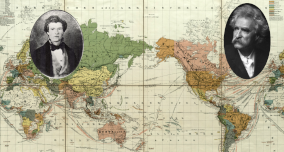Because of Vicksburg's location on the Mississippi River, it built extensive trade from the prodigious steamboat traffic in the 19th century. It shipped out cotton coming to it from surrounding counties and was a major trading city in West Central Mississippi.
However, in 1876, a Mississippi River flood cut off the large meander next to Vicksburg through the De Soto Point, which changed the Mississippi River's course away from the city. Vicksburg only retained access to an oxbow lake formed from the old channel of the river, which effectively isolated the city from accessing the Mississippi riverfront. The city's economy suffered greatly due to the lack of a functional river port; Vicksburg would not be a river town again until the completion of the Yazoo Diversion Canal in 1903 by the U.S. Army Corps of Engineers.[7]
Between 1881 and 1894, the Anchor Line, a prominent steamboat company on the Mississippi River from 1859 to 1898, operated a steamboat called the City of Vicksburg.
n the first few years after the Civil War, white Confederate veterans developed the Ku Klux Klan, beginning in Tennessee; it had chapters throughout the South and attacked freedmen and their supporters. It was suppressed about 1870. By the mid-1870s, new white paramilitary groups had arisen in the Deep South, including the Red Shirts in Mississippi, as whites struggled to regain political and social power over the black majority. Elections were marked by violence and fraud as white Democrats worked to suppress black Republican voting.
In August 1874, a black sheriff, Peter Crosby, was elected in Vicksburg. Letters by a white planter, Batchelor, detail the preparations of whites for what he described as a "race war," including acquisition of the newest Winchester guns. On December 7, 1874, white men disrupted a black Republican meeting celebrating Crosby's victory and held him in custody before running him out of town.[15] He advised blacks from rural areas to return home; along the way, some were attacked by armed whites. During the next several days, armed white mobs swept through black areas, killing other men at home or out in the fields. Sources differ as to total fatalities, with 29–50 blacks and 2 whites reported dead at the time. Twenty-first-century historian Emilye Crosby estimates that 300 blacks were killed in the city and the surrounding area of Claiborne County, Mississippi.[16] The Red Shirts were active in Vicksburg and other Mississippi areas, and black pleas to the federal government for protection were not met.
At the request of Republican Governor Adelbert Ames, who had left the state during the violence, President Ulysses S. Grant sent federal troops to Vicksburg in January 1875. In addition, a congressional committee investigated what was called the "Vicksburg Riot" at the time (and reported as the "Vicksburg Massacre" by northern newspapers.) They took testimony from both black and white residents, as reported by the New York Times, but no one was ever prosecuted for the deaths. The Red Shirts and other white insurgents suppressed Republican voting by both whites and blacks; smaller-scale riots were staged in the state up to the 1875 elections, at which time white Democrats regained control of a majority of seats in the state legislature.
Under new constitutions, amendments and laws passed between 1890 in Mississippi and 1908 in the remaining southern states, white Democrats disenfranchised most blacks and many poor whites by creating barriers to voter registration, such as poll taxes, literacy tests, and grandfather clauses. They passed laws imposing Jim Crow and racial segregation of public facilities.
